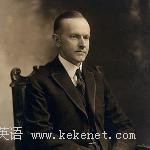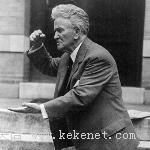[page]听力文本[/page]
American History:Calvin Coolidge Wins in Election of 1924
BOB DOUGHTY: Welcome to THE MAKING OF A NATION – American history in VOA Special English.
Vice President Calvin Coolidge became president in nineteen twenty-three following the death of President Warren Harding. Coolidge quickly gained the trust of most Americans by investigating the crimes of Harding's top officials. The conservative economic policies of the new president also won wide support.
Coolidge had one year to prove his abilities to the American people before the election of nineteen twenty-four.
This week in our series, Kay Gallant and Harry Monroe tell us about that election.
(MUSIC)
KAY GALLANT: Coolidge was a quiet man who believed in limited government policies. But his silence hid a fighting political spirit. Coolidge had worked for many years to gain the White House. He would not give it up without a struggle.
Coolidge moved quickly after becoming president to gain control of the Republican Party. He named his own advisers to important jobs. And he replaced a number of officials with people whose loyalty he could trust.
Most Republicans liked Coolidge. They felt his popular policies would make him a strong candidate in the presidential election. For this reason, Coolidge faced only one serious opponent for the Republican presidential nomination in nineteen twenty-four.
Coolidge's opponent was the great automobile manufacturer, Henry Ford of Michigan. Ford had been a candidate for Congress in nineteen eighteen. He lost that election. But after the election, some people in his company began to call for Ford to be the Republican presidential nominee in nineteen twenty-four.
 Calvin Coolidge
Calvin CoolidgeHARRY MONROE: Ford was one of history's greatest inventors and manufacturers. But he had limited skills in politics. Ford was poorly educated. He had extreme opinions about a number of groups. He hated labor unions, the stock market, dancing, smoking, and drinking alcohol. But most of all, Ford hated Jews. He produced a number of publications accusing the Jewish people of organizing international plots.
At first, Ford appeared to be a strong opponent to Coolidge. But soon, he realized that Coolidge was too strong politically. His economic policies were popular among the people. And the nation was at peace. The party could not deny Coolidge's nomination. Ford himself put an end to his chances by telling the nation that it was "perfectly safe with Coolidge."
Calvin Coolidge won the presidential nomination easily at the nineteen twenty-four Republican convention in Cleveland, Ohio. The Republican delegates chose Charles Dawes of Illinois to run with him as the vice presidential candidate.
KAY GALLANT: The Democratic Party was much more divided. Many of the groups that traditionally supported Democratic candidates now were fighting against each other. For example, many farmers did not agree on policies with people living in cities. The educated did not agree with uneducated people. And many Protestant workers felt divided from Roman Catholic and Jewish workers.
These differences made it hard for the Democratic Party to choose a national candidate. There was little spirit of compromise.
Two main candidates campaigned for the Democratic nomination. The first was former Treasury Secretary William McAdoo. McAdoo had the support of many Democrats because of his strong administration of the railroads during the world war. Democratic voters in Southern and Western states liked him because of his conservative racial policies and his opposition to alcohol.
The second main candidate was Alfred Smith, the governor of New York. Smith was a Roman Catholic. He was very popular with people in the Eastern cities, Roman Catholics, and supporters of legal alcohol. But many rural delegates to the convention did not trust him.
HARRY MONROE: The Democratic Party convention met in New York City. It quickly became a battle between the more liberal delegates from the cities and the more conservative delegates from rural areas.
It was July. The heat was intense. Speaker after speaker appealed to the delegates for votes. One day passed. Then another. For nine days, the nation listened on the radio as the delegates argued about the nomination.
The delegates voted ninety-five times without success. Finally, McAdoo and Smith agreed to withdraw from the race. Even then, the delegates had to vote eight more times before they finally agreed on compromise candidates.
The Democratic delegates finally chose John Davis to be their presidential nominee. Davis was a lawyer for a major bank. He had served briefly under President Wilson as ambassador to Britain. The delegates also chose Charles Bryan to be the vice presidential candidate. Bryan was the younger brother of the famous Democrat and populist leader, William Jennings Bryan.

KAY GALLANT: There also was a third party in the nineteen twenty-four election. Many of the old progressive supporters of Theodore Roosevelt and Woodrow Wilson opposed the choices of the Republicans and Democrats. They thought the country needed another candidate to keep alive the spirit of reform.
Progressive candidates had done well in the congressional election of nineteen twenty-two. But following the election, communists had gained influence in one of the major progressive parties. Most progressives did not want to join with communists. So, they formed a new progressive party. The new party named Senator Robert LaFollette of Wisconsin to be its presidential candidate.
LaFollette campaigned for increased taxes on the rich and public ownership of water power. He called for an end to child labor and limits on the power of the courts to interfere in labor disputes. And LaFollette warned the nation about the dangers of single, large companies gaining control of important industries.
HARRY MONROE: Coolidge won the nineteen twenty-four election easily. He won the electoral votes of thirty-five states to just twelve for Davis of the Democrats. LaFollette won only Wisconsin, his home state. Coolidge also won more popular votes than the other two candidates together.
The American people voted for Coolidge partly to thank him for bringing back honesty and trust to the White House following the crimes of the Harding administration. But the main reason was that they liked his conservative economic policies and his support of business.
KAY GALLANT: LaFollette's Progressive Party died following the nineteen twenty-four election. Most of his supporters later joined the Democrats. But the reform spirit of their movement remained alive through the next four years.
They were difficult years for Progressives. Conservatives in Congress passed laws reducing taxes for corporations and richer Americans.
HARRY MONROE: Progressives fought for reforms in national agriculture policies. Most farmers did not share in the general economic growth of the nineteen twenties. Instead, their costs increased while the price of their products fell. Many farmers lost their farms.
Farmers and progressives wanted the federal government to create a system to control prices and the total supply of food produced. They said the government should buy and keep any extra food that farmers produced. And they called for officials to help them export food.
Coolidge and most Republicans rejected these ideas. They said it was not the business of a free government to fix farm prices. And they feared the high costs of creating a major new government department and developing export markets.
Coolidge vetoed three major farm reform bills following his election.
KAY GALLANT: The debate over farm policy was, in many ways, like the debate over taxes or public controls on power companies. There was a basic difference of opinion about the proper actions of government.
More conservative Americans believed the purpose of government was to support private business, not to control it. But more liberal Americans believed that government needed to do more to make sure that citizens of all kinds could share the nation's wealth more equally.
Coolidge and the Republicans were in control in the nineteen twenties. For this reason, the nation generally stayed on a conservative path. The Democrats and Progressives would have to wait until later to put many of their more liberal ideas into action.
(MUSIC)
BOB DOUGHTY: Our program was written by David Jarmul. The narrators were Kay Gallant and Harry Monroe. You can find our series online with pictures, transcripts, MP3s and podcasts at www.utensil-race.com. You can also follow us on Facebook and Twitter at VOA Learning English. Join us again next week for THE MAKING OF A NATION -- an American history series in VOA Special English.
[page]词汇学习[/page]
1.replace vt.替换,取代;把…放回原处
2.nomination n.提名;推荐;任命;指派
例句:She has withdrawn her nomination as chairman.
她已退出主席一职的提名。
Nominations are invited for the post of party chairman.
为党主席职位征集候选人。
3.compromise v.妥协;退让
例句:I am prepared to make some concession on minor details, but I cannot compromise on fundamentals.
在一些细节上我可以作些让步,但在基本原则上我是不会妥协的。
4.withdraw v.(使)撤退[出]; (使)撤回, 撤离
例句:I want to withdraw a statement I made earlier.
我想收回我早些时候发表的一项声明。
The general decided to withdraw his soldiers.
那位将军决定撤军。
5.progressive adj.不断前进的, 有进展的, 逐渐上升的
例句:This is a progressive course in English study.
这是英语学习的渐进课程。
It was a progressive disease and he would suffer more and more.
病情逐渐加剧, 他将忍受越来越大的痛苦。
[page]短语学习[/page]
1.Ford himself put an end to his chances by telling the nation that it was "perfectly safe with Coolidge."
put an end to结束,终止
例句:put an end to waste; eliminate waste
杜绝浪费
2.For example, many farmers did not agree on policies with people living in cities.
agree on对某事〔物〕有同样看法, 商定〔同意〕某事, 商定做某事
例句:We agree on the question.
我们在这个问题上意见一致。
They agreed on leaving there the next day.
他们一致同意第二天离开那里。
3.Coolidge and the Republicans were in control in the nineteen twenties.
in control在控制之下
例句:Who is in control here?
这里由谁负责?